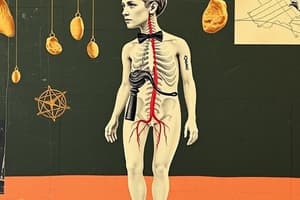Podcast
Questions and Answers
What do cell membranes primarily regulate?
What do cell membranes primarily regulate?
- Nutrient absorption
- Cellular metabolism
- Passage of substances (correct)
- Cell communication
Which of the following describes long-term physiological adaptations?
Which of the following describes long-term physiological adaptations?
- Immediate changes in enzyme activity
- Temporary adjustments to stress
- Structural changes over time (correct)
- Reversible alterations in cell function
Which factor does NOT influence physiological processes?
Which factor does NOT influence physiological processes?
- Genetic factors
- Environmental temperature
- Dietary preferences (correct)
- Altitude
What is the main focus of pathophysiology?
What is the main focus of pathophysiology?
Which statement best describes physiological adaptations?
Which statement best describes physiological adaptations?
What is physiology primarily concerned with?
What is physiology primarily concerned with?
Which system is responsible for communication and coordination within the body?
Which system is responsible for communication and coordination within the body?
What role do hormones play in the body?
What role do hormones play in the body?
How does the cardiovascular system function?
How does the cardiovascular system function?
Which of the following is a primary function of the respiratory system?
Which of the following is a primary function of the respiratory system?
What is the main purpose of the excretory system?
What is the main purpose of the excretory system?
What does homeostasis refer to?
What does homeostasis refer to?
What type of feedback mechanism counteracts changes to maintain homeostasis?
What type of feedback mechanism counteracts changes to maintain homeostasis?
Flashcards
Physiology
Physiology
The study of how living organisms and their parts function
Nervous System
Nervous System
System responsible for communication and coordination in the body
Endocrine System
Endocrine System
System regulating bodily functions using hormones
Homeostasis
Homeostasis
Signup and view all the flashcards
Cardiovascular System
Cardiovascular System
Signup and view all the flashcards
Negative Feedback Loop
Negative Feedback Loop
Signup and view all the flashcards
Positive Feedback Loop
Positive Feedback Loop
Signup and view all the flashcards
Respiratory System
Respiratory System
Signup and view all the flashcards
Cellular Physiology
Cellular Physiology
Signup and view all the flashcards
Physiological Adaptations
Physiological Adaptations
Signup and view all the flashcards
Factors influencing Physiology
Factors influencing Physiology
Signup and view all the flashcards
Pathophysiology
Pathophysiology
Signup and view all the flashcards
Cellular Communication
Cellular Communication
Signup and view all the flashcards
Study Notes
Introduction to Physiological Processes
- Physiology is the study of the functions of living organisms and their parts.
- It encompasses a wide range of processes, from cellular to organismal levels.
- Physiological processes are fundamental to life, including growth, development, reproduction, and response to stimuli.
- The study of physiology often involves experimental methods to uncover the mechanisms behind these processes.
Key Physiological Systems
- Nervous System: Responsible for communication and coordination throughout the body.
- Neurons transmit signals using electrical and chemical processes.
- The nervous system controls voluntary and involuntary actions.
- Sensory systems allow organisms to perceive the environment.
- Endocrine System: Regulates bodily functions using hormones.
- Hormones are chemical messengers that travel through the bloodstream.
- Hormones control metabolism, growth, and reproduction.
- Cardiovascular System: Transports materials throughout the body.
- Heart pumps blood, carrying nutrients, oxygen, and waste products.
- Blood vessels distribute blood to various tissues.
- Respiratory System: Facilitates gas exchange.
- Lungs take in oxygen and release carbon dioxide.
- Gas exchange occurs across thin membranes in the lungs.
- Digestive System: Breaks down food for absorption.
- Digestion involves mechanical and chemical processes.
- Nutrients are absorbed by the intestines.
- Excretory System: Eliminates waste products.
- Kidneys filter blood and produce urine.
- Other organs contribute to waste removal.
- Muscular System: Enables movement and support.
- Muscles contract and relax to produce force.
- Muscles work in conjunction with the skeletal system.
- Skeletal System: Provides structure and support.
- Bones provide a framework for the body.
- Bones protect vital organs.
- Immune System: Defends against pathogens.
- Cells and molecules of the immune system recognize and fight infections.
Homeostasis
- Homeostasis is the maintenance of a relatively stable internal environment.
- It is crucial for proper physiological function.
- Control mechanisms maintain homeostasis through feedback loops.
- Negative feedback loops counteract changes in physiological conditions.
- Positive feedback loops amplify changes.
- Examples of key variables regulated via homeostasis include body temperature, blood glucose level, blood pH, and blood pressure.
Cellular Physiology
- Cellular physiology studies the functions of cells.
- Cell membranes regulate the passage of substances into and out of cells.
- Cellular metabolism involves all processes that occur inside cells.
- Cellular communication allows coordination between cells.
Physiological Adaptations
- Physiological adaptations are modifications that enhance survival and reproduction.
- These adaptations can be short-term or long-term.
- Short-term physiological adaptations often involve changes in the activity of existing structures.
- Long-term adaptations may result in structural changes over time.
- Adaptation to environmental factors such as temperature and altitude are common examples.
Factors Influencing Physiology
- Environmental factors, like temperature, pressure, and altitude, heavily influence physiological processes.
- Genetic factors determine individual responses to stimuli and environmental conditions.
- Age can dramatically alter the functionality of systems.
Pathophysiology
- Pathophysiology studies the effects of disease on physiological processes, or how disease impacts function
Conclusion
- Physiology encompasses a vast and complex interplay of processes that underpin life.
Studying That Suits You
Use AI to generate personalized quizzes and flashcards to suit your learning preferences.




